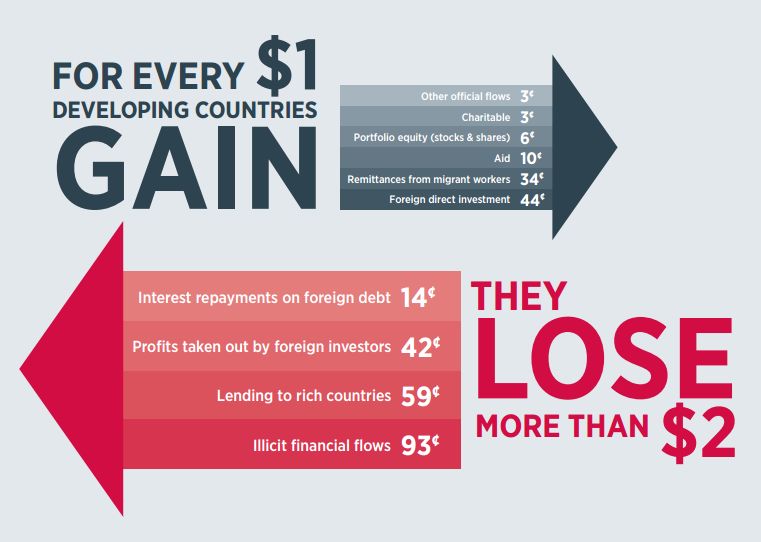How Are Open Data Programs Related to Investment Flows in Developing Countries?
The EURODATA report The State of Finance for Developing Countries 2014 by Jesse Griffiths reports that “… losses of financial resources by developing countries have been more than double the inflows of new financial resources since the financial crisis.” This is the graphic displayed on the front page of the EURODATA report:

Source: The State of Finance for Developing Countries, 2014; an assessment of the scale of all sources of finance available to developing countries, by Jesse Griffiths. Published by EURODAD, The European Network on Debt and Development, 2014 (http://www.eurodad.org/)
The report focuses primarily on financial resources in gross terms: investment dollars “in” and investment dollars “out” of developing countries. The report does not attempt to quantify the impacts such investments flows have on the developing countries themselves and leaves such analyses for future volumes.
Why are such investment analyses important? And what does this have to do with “open data” programs in developing countries?
The first question, conceptually at least, is the easier one to answer — at least for this non-economist! Presumably, the more money that stays “in country” the more the potential impact there will be “in country” on further re-investment, jobs, income, and other valued impacts.
But, you may ask, what does this have to do with “open data” programs where data generated by or connected with government programs in developing countries are made available for re-use and exploitation? The EURODAD report does not address this question. It does list on page 36 “other important characteristics of available resources”:
- Macro-economic risks
- Accountability and transparency
- Impacts on domestic politics
- Contributions to sustainable development
The last three of these — accountability and transparency, impacts on domestic politics, and contributions to sustainable development — are often associated with open data programs, especially the fourth when financial impacts are being considered.
Contributions of open data programs to sustainable development in developing countries are of special interest to organizations such as the UN (see A World That Counts: Mobilising The Data Revolution for Sustainable Development) and the World Bank (see New surveys reveal dynamism, challenges of open data-driven businesses in developing countries which I discussed in Looking Beyond Open Data Availability to Managing Open Data Value). An excellent overview of public research into open data’s economic impacts can be found in GovLab’s The GovLab Selected Readings on the Economic Impact of Open Data.
What you find when you work on “open data” projects (disclosure: I work with international open data consultancy BaleFire Global LLC) is that even small open data projects can have complex political, economic, social, and educational implications. The programs that “spawn” open data have goals and objectives of their own that are unrelated to open data. Making data “open” for re-use and exploitation can be viewed both from the perspective of the originating program and from the perspective of the developer or entrepreneur.
- The data source program’s manager might ask, “Will spending money on making our program’s data available for re-use and exploitation via APIs and file downloads help us accomplish our program’s objectives?”
- The entrepreneur-data-user might ask, “How reliable and clean are the data we can get from the open data program? How much will it cost us to use these data in the products and services we are developing?”
We can see how these two perspectives might impact measuring the relationship between open data program expenditures and the ratio between inc-country and out-of-country investment flows as described in the EURODAD report. For example,
- Does a government agency (or an external funding agency such as the World Bank) have a responsibility to ensure that potential entrepreneurs have the investment capital required to start or expand new data-intensive businesses that rely on open data?
- Should an entrepreneur in a developing economy minimize reliance on out-of-country investment sources?
- How do the investment requirements of data intensive businesses in developing countries compare with other types of businesses that are potentially more capital intensive – and therefore potentially more reliant on out-of-country financing?
Such questions are reasonable given that “capacity-building” is often a development agency’s goals. As an example see the World Bank’s Trust Fund for Statistical Capacity Building (TFSCB). Also, the interaction of public and private resources in expanding access to government-sourced “open data” is increasingly being examined given the constrained resources of so many government agencies. In fact, in some countries efforts are being made to research the possibility of private sector data somehow becoming part of national “open data” efforts; as an example of this refer to New Zealand’s Consultation questions – expansion of the Open Government Data Programme.
Inevitably, it seems to me, efforts to “open up” public data for exploitation and re-use by private sector organizations (and vice versa, as we see with the New Zealand effort referenced above) may force us to re-consider traditional distinctions between public and private sector organizations and their roles and responsibilities.
Once data resources are digitized and made available for access and use, restricting or limiting their use can become difficult, complex, and expensive. Traditional and private sector institutions that rely too heavily on such distinctions for controlling social and business activities may find it difficult to adjust to and take advantage of such trends.
Related reading:
- Are Collaboration Tools Part of the IT Infrastructure or Part of the Application Portfolio?
- Can Meat-and-Potatoes “Big Data” Help Detroit?
- Developing Digital Strategies for Web-based Public Access to Government Performance Data
- Is the Concept of a “National Manufacturing Technology Strategy” Dead in the Water?
- Justifying Collaboration in Complex Programs such as Federal Acquisitions
- The Knight Foundation’s Civic Tech Report: “Open Government” Expenditures
- On Measuring Open Data Benefits in International Development Projects
- Planning for Big Data: Lessons Learned from Large Energy Utility Projects
- Promoting Technology Enabled Collaboration in Complex R&D Environments
- Recommendations for Collaborative Management of Government Data Standardization Projects
- Recouping “Big Data” Investment in One Year Mandates Serious Project Management
- What Makes a Government Program “Transparent”?
Copyright © 2014 by Dennis D. McDonald




